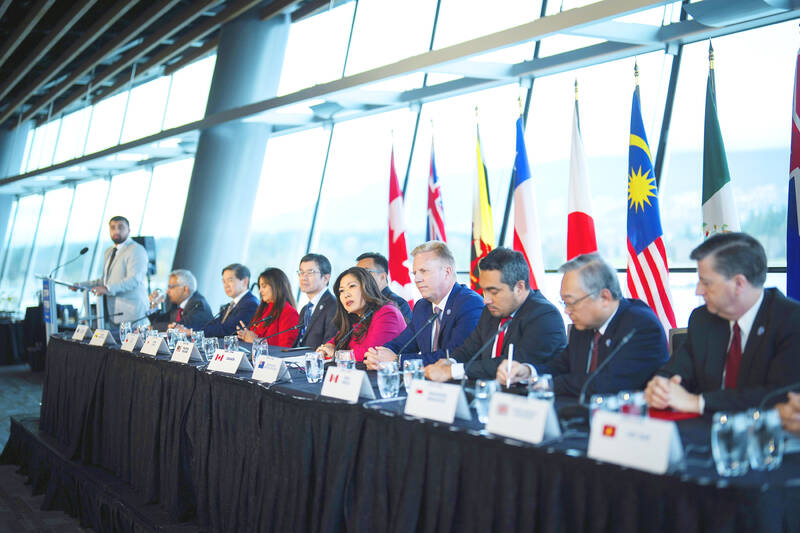The Office of Trade Negotiations yesterday said it was disappointed by what appears to be a delay in the consideration of Taiwan’s application to join the Comprehensive and Progressive Agreement for Trans-Pacific Partnership (CPTPP).
The office in a statement expressed “deep regret and disappointment” that CPTPP members did not reach an agreement to initiate Taiwan’s accession process during their commission meeting in Vancouver, Canada, on Wednesday and Thursday.
The office urged CPTPP members to “not have political considerations” and to agree to establish a working group to handle Taiwan’s membership.

Photo: AP
The office was likely referring to the reluctance of some CPTPP member states to address the Taiwan issue as it might alienate their main trading partner China, which has submitted its own application to the bloc and opposed Taiwan’s accession.
Achieving a consensus among CPTPP members remained a major hurdle for Taiwan’s bid, the office said.
However, it is committed to bolstering economic ties with them to gain their support for Taiwan’s inclusion, it added.
Taiwan has launched a diplomatic push to improve official engagements with individual CPTPP members since submitting its application in September 2021 and has completed legislative reforms to bring Taiwan’s trade-related regulations in line with the bloc’s standards, it said.
At the CPTPP meeting, the members approved Costa Rica’s bid to commence the accession process.
The Central American nation applied to join the bloc in August 2022.
“The CPTPP family is expanding,” Canadian International Minister of Trade Mary Ng told a news conference following the meeting, adding that the bloc was establishing a working group to work toward Costa Rica’s accession.
Ng did not respond directly to a question about Taiwan’s application status, saying instead: “We remain completely open to having new members join the CPTPP” as long as they adhere to “the Auckland principles.”
She was referring to the requirements set by the CPTPP for memberships, which are meeting the trade pact’s high standards, demonstrating a strong track record of meeting trade obligations and garnering a consensus among all members.
Asked if Taiwan’s application has been put on hold because of China, Ng said that Canada’s “one China” policy had not changed.
However, “the work that we do together as CPTPP partners is one where we do work on consensus, and consensus means all of the partners would need to achieve that consensus in order for us to move to that next step,” she added.
The CPTPP is one of the biggest trade blocs in the world, representing about 15 percent of the global economy.
It has 11 members: Australia, Brunei, Canada, Chile, Japan, Malaysia, Mexico, New Zealand, Peru, Singapore and Vietnam, with the UK set to become the 12th member next month.
Canada is the chair of the CPTPP Commission for this year. Australia is to take the baton next year.

Taiwan is stepping up plans to create self-sufficient supply chains for combat drones and increase foreign orders from the US to counter China’s numerical superiority, a defense official said on Saturday. Commenting on condition of anonymity, the official said the nation’s armed forces are in agreement with US Admiral Samuel Paparo’s assessment that Taiwan’s military must be prepared to turn the nation’s waters into a “hellscape” for the Chinese People’s Liberation Army (PLA). Paparo, the commander of the US Indo-Pacific Command, reiterated the concept during a Congressional hearing in Washington on Wednesday. He first coined the term in a security conference last

A magnitude 4.3 earthquake struck eastern Taiwan's Hualien County at 8:31am today, according to the Central Weather Administration (CWA). The epicenter of the temblor was located in Hualien County, about 70.3 kilometers south southwest of Hualien County Hall, at a depth of 23.2km, according to the administration. There were no immediate reports of damage resulting from the quake. The earthquake's intensity, which gauges the actual effect of a temblor, was highest in Taitung County, where it measured 3 on Taiwan's 7-tier intensity scale. The quake also measured an intensity of 2 in Hualien and Nantou counties, the CWA said.

The Overseas Community Affairs Council (OCAC) yesterday announced a fundraising campaign to support survivors of the magnitude 7.7 earthquake that struck Myanmar on March 28, with two prayer events scheduled in Taipei and Taichung later this week. “While initial rescue operations have concluded [in Myanmar], many survivors are now facing increasingly difficult living conditions,” OCAC Minister Hsu Chia-ching (徐佳青) told a news conference in Taipei. The fundraising campaign, which runs through May 31, is focused on supporting the reconstruction of damaged overseas compatriot schools, assisting students from Myanmar in Taiwan, and providing essential items, such as drinking water, food and medical supplies,

New Party Deputy Secretary-General You Chih-pin (游智彬) this morning went to the National Immigration Agency (NIA) to “turn himself in” after being notified that he had failed to provide proof of having renounced his Chinese household registration. He was one of more than 10,000 naturalized Taiwanese citizens from China who were informed by the NIA that their Taiwanese citizenship might be revoked if they fail to provide the proof in three months, people familiar with the matter said. You said he has proof that he had renounced his Chinese household registration and demanded the NIA provide proof that he still had Chinese